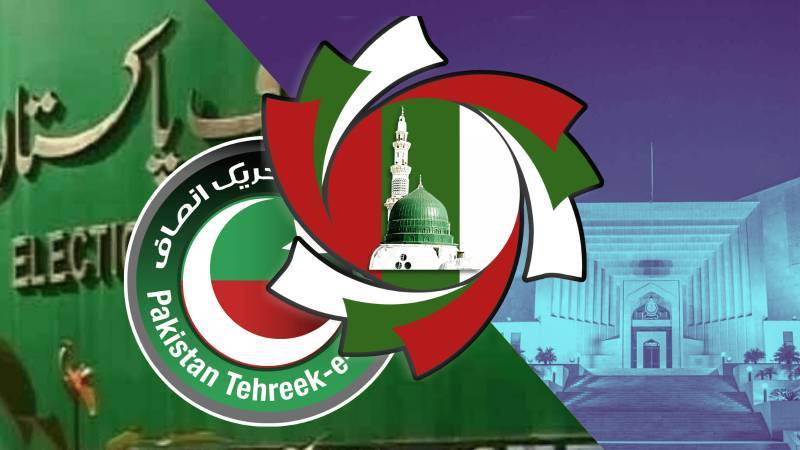
The top court on Saturday issued at a critical hour a clarification to its earlier order wherein it directed the top poll body to register returned candidates as members of the Pakistan Tehreek-e-Insaf (PTI) all those returned candidates who had submitted party tickets or certificates either when submitting their nomination forms or after the court's July order.
The order could prove to be a blow to the government, which was banking on confusion regarding the status of independent returned candidates, whether they are members of PTI or not, to force a constitutional amendment which would grant incumbent Chief Justice Qazi Faez Isa and all subsequent chief justices a fixed term of three years in the hot seat.
In August, the Election Commission of Pakistan (ECP) had approached the Supreme Court to seek clarity on the short order from the eight members, who had formed the majority in the 13-member full bench of the top court which had on July 12 issued a verdict directing that the PTI was a valid political and parliamentary party and that all those successfully returned candidates who had submitted nomination papers with certificates or tickets from the PTI should be included in the party while other Independent returned candidates should be provided an opportunity to choose which parliamentary party do they wish to join. The ECP also asked who would confirm the political affiliation of Independent candidates in the absence of a valid organisational structure of the PTI recognised by the Commission.
In response to that request, the eight majority judges of the top court issued their response on Saturday.
The court noted that in notices issued by the ECP to the PTI, Barrister Gohar Ali Khan was identified as the party's chief, while other documents showed Gohar as the party's chairman and Omar Ayub Khan as the secretary general.
"Putting together the record placed before us, and considering the same in the light of the Short Order, leaves in little doubt that the clarification sought by the Commission in terms of the CMA 7540/2024 is nothing more than a contrived device and the adoption of dilatory tactics, adopted to delay, defeat and obstruct implementation of the decision of the court. This cannot be countenanced," read the order, adding that the application filed by the ECP was "misconceived".
"Having itself recognised Barrister Gohar Ali Khan as the Chairman of PTI, the Commission cannot now turn around and purport to seek guidance from the court with regard to how the certifications are to be dealt with," it said, adding, "The Commission cannot approbate and reprobate, taking whatever (shifting) stance as it desires and as may seem to suit its immediate purposes for the moment."
The court stressed that not only did the eight majority judges accept and recognise the PTI as an enlisted political party but also three minority judges, including Chief Justice Qazi Faez Isa, Justice Yahya Afridi and Justice Jamal Khan Mandokhail. It further asserted that these judges appear to have accepted the validity of party certificates issued by Barrister Gohar in his capacity as PTI chairman.
"That sufficed absolutely for purposes of the short order. It would be completely illogical to assume that a political party, a juristic person, is fully functional, yet there are no natural persons who are either [de facto] or [de jure] performing its functions or running its affairs."
The court further warned the ECP: "There could have been no conceivable doubt that the certifications referred to above were correct and valid in terms of the short order and the continued denial and refusal of the Commission to accept the same, as and when filed, is constitutionally and legally incorrect and may expose the
Commission to such further or other action as may be warranted in terms of the Constitution and the law."
The court further noted that when a returned candidate filed the requisite statement and its confirmation from the political party concerned, the seat secured by such a candidate shall be forthwith deemed to be a seat secured by that political party and "stood determined and fixed as a matter of law as on those dates and no subsequent act can alter what became, on the respective dates, past and closed transactions."
"The said returned candidates were and are the returned candidates of PTI and thus members of the parliamentary party of PTI in the National Assembly and Provincial Assemblies concerned, for all constitutional and legal purposes," the order read.
It added that the Commission's attempt at confusing and clouding what was otherwise an absolutely clear matter of the Constitution and law must, therefore, be strongly deprecated.
"The continued failure of, and refusal by, the Commission to perform this legally binding obligation may, as noted, have consequences. This obligation must be discharged forthwith."
While hearing the main case, when the Supreme Court had sought records of nomination papers filed by independent candidates, it emerged that 39 returned candidates had filed their nomination papers by citing affiliation with the PTI while another 41 had not listed any party affiliation.
It is pertinent to add here that the ruling Pakistan Muslim League-Nawaz (PML-N) and the Pakistan Peoples Party (PPP) had filed review petitions against the top court's majority verdict, but the top court refused to hear them forthwith, citing procedural issues, including the issuance of the long verdict and vacations of judges.

